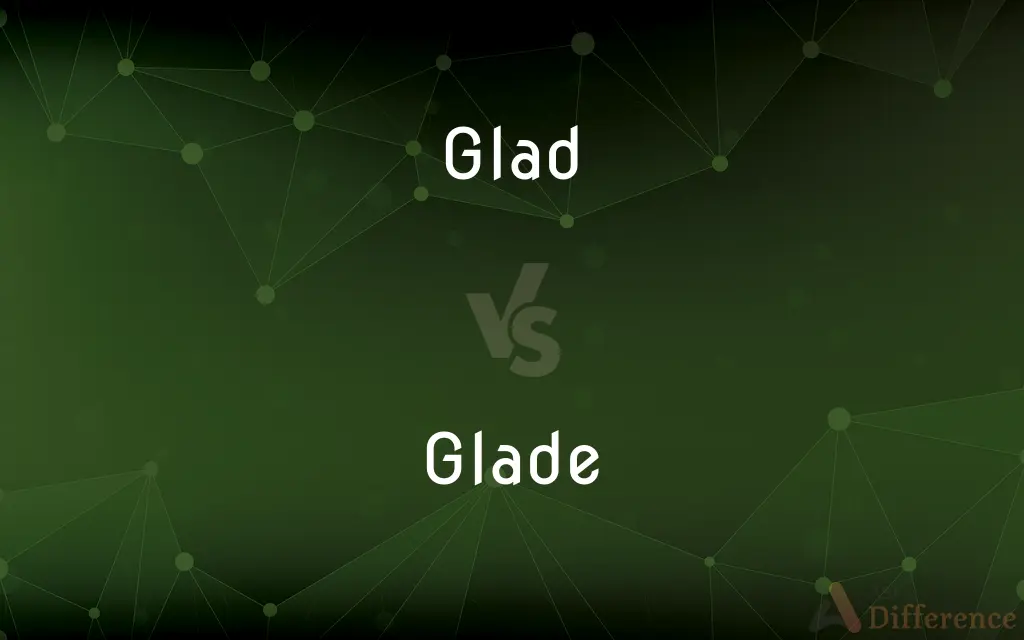Glad vs. Glade — What's the Difference?
By Maham Liaqat & Urooj Arif — Updated on March 17, 2024
Glad expresses feelings of pleasure or contentment, while a glade is a clearing within a forest. These terms differ fundamentally in meaning—one describes an emotion, the other a physical space.

Difference Between Glad and Glade
Table of Contents
ADVERTISEMENT
Key Differences
Glad is used to describe a state of happiness or pleasure, often in response to a specific situation or event. For instance, one might be glad about receiving good news. On the other hand, a glade refers to an open space within a wooded area, where sunlight can penetrate and vegetation might differ from the denser forest surroundings.
While glad can be applied in various contexts relating to emotional responses, a glade is specifically tied to a geographical and ecological setting. Someone might feel glad while standing in a glade, but the terms operate in distinctly different realms.
Glad often pertains to human emotions and can be used to describe feelings in social interactions, communications, and personal reflections. Conversely, a glade is a natural phenomenon and might be discussed in topics related to geography, ecology, or outdoor activities.
In language, glad is an adjective that modifies nouns, indicating a quality or condition. A glade, however, is a noun, representing a physical entity in the natural world. This grammatical difference highlights their distinct roles in sentence structure and meaning.
The use of glad can vary widely, from casual conversations to formal writings, embodying a broad spectrum of positive emotional states. Glade, while not as commonly used in everyday language, holds significance in literature, poetry, and discussions about nature, often evoking imagery of serene, natural beauty.
ADVERTISEMENT
Comparison Chart
Part of Speech
Adjective
Noun
Meaning
Expresses pleasure or contentment
Refers to a clearing in a forest
Context
Emotional responses, social interactions
Geography, ecology, outdoor settings
Common Usage
"I'm glad you came."
"We found a beautiful glade in the forest."
Associated Terms
Happy, pleased, delighted
Clearing, opening, meadow
Compare with Definitions
Glad
Feeling pleasure or happiness.
She was glad to hear the good news.
Glade
A clearing used for gatherings or activities.
We set up our picnic in a sunny glade.
Glad
Used in polite requests or offers.
I'd be glad to answer your question.
Glade
A naturally occurring open area in woodland.
Birds sang from the trees surrounding the glade.
Glad
Causing joy or pleasure.
The sunny weather was a glad change.
Glade
A spot where sunlight reaches the forest floor.
Wildflowers bloomed in the bright glade.
Glad
Willing or pleased to do something.
He was glad to help out.
Glade
An opening that offers a break from the surrounding density.
The hikers rested in a serene glade.
Glad
Gratified or satisfied.
They were glad for the break in their routine.
Glade
An open space in a wood or forest
A forest glade
Glades of birch
Glad
Experiencing or exhibiting joy and pleasure.
Glade
An open space in a forest.
Glad
Appreciative
Was glad to be home.
Glade
A tract of marshland.
Glad
Providing joy and pleasure
A glad occasion.
Glade
An open passage through a wood; a grassy open or cleared space in a forest.
Glad
Very willing; pleased
Glad to help.
Glade
(colloquial) An everglade.
Glad
To gladden.
Glade
An open space in the ice on a river or lake.
Glad
A gladiolus.
Glade
A bright surface of ice or snow.
A glade of ice
Glad
Pleased, happy, gratified.
I'm glad the rain has finally stopped.
Glade
(obsolete) A gleam of light.
Glad
(obsolete) Having a bright or cheerful appearance; expressing or exciting joy; producing gladness.
Glade
(obsolete) A bright patch of sky; the bright space between clouds.
Glad
To make glad.
Glade
An open passage through a wood; a grassy open or cleared space in a forest.
There interspersed in lawns and opening glades.
Glad
Wearing a gay or bright appearance; expressing or exciting joy; producing gladness; exhilarating.
Her conversationMore glad to me than to a miser money is.
Glad evening and glad morn crowned the fourth day.
Glade
An everglade.
Glad
To make glad; to cheer; to gladden; to exhilarate.
That which gladded all the warrior train.
Each drinks the juice that glads the heart of man.
Glade
An opening in the ice of rivers or lakes, or a place left unfrozen; also, smooth ice.
Glad
To be glad; to rejoice.
Glad
Showing or causing joy and pleasure; especially made happy;
Glad you are here
Glad that they succeeded
Gave a glad shout
A glad smile
Heard the glad news
A glad occasion
Glad
(`lief' is archaic) very willing;
Was lief to go
Glad to help
Glad
Feeling happy appreciation;
Glad of the fire's warmth
Glad
Cheerful and bright;
A beaming smile
A glad May morning
Common Curiosities
Is a glade always found in a forest?
Typically, yes, a glade is an open space within a forest, but it can also refer to similar clearings in other dense vegetation.
What does "glad" mean?
Glad refers to feeling pleased, happy, or contented.
Can "glad" be used in formal writing?
Yes, "glad" can be appropriately used in both formal and informal contexts.
How is a glade formed?
Glades can form naturally due to a lack of sunlight in dense forests or be created by disturbances that clear vegetation.
Can "glad" describe a physical state?
While "glad" primarily describes an emotional state, it can indirectly relate to physical expressions of happiness, like smiling.
Are glades important for ecosystems?
Yes, glades can provide unique habitats and conditions that support diverse flora and fauna.
Is "glad" only used to describe positive emotions?
Primarily, yes, "glad" is associated with positive feelings, though it can be used in complex emotional contexts.
Can the term "glad" be used to describe someone's willingness?
Yes, "glad" can express willingness or readiness to do something, e.g., "I'd be glad to help."
Do all forests have glades?
Not all, but many forests have glades due to natural clearings or environmental factors.
Can "glad" express relief?
Yes, "glad" can express relief as well as pleasure, such as being glad that something unpleasant is over.
Can "glad" be used interchangeably with "happy"?
"Glad" and "happy" are similar, but "glad" often implies a reaction to a specific event, while "happy" can be more general.
Are glades man-made or natural?
Glades can be both, though they are most commonly natural formations.
Why are glades important for biodiversity?
Glades create microhabitats that can support species not found in the denser parts of forests, contributing to biodiversity.
Is "glade" a common term in geography?
"Glade" is a specific term used in geography and ecology to describe open spaces within forests.
How do people use glades?
Glades are often used for recreational activities, like picnicking or nature walks, and can be significant in ecological studies.
Share Your Discovery

Previous Comparison
Approval vs. Permission
Next Comparison
Concierge vs. LogeAuthor Spotlight
Written by
Maham LiaqatCo-written by
Urooj ArifUrooj is a skilled content writer at Ask Difference, known for her exceptional ability to simplify complex topics into engaging and informative content. With a passion for research and a flair for clear, concise writing, she consistently delivers articles that resonate with our diverse audience.
















































